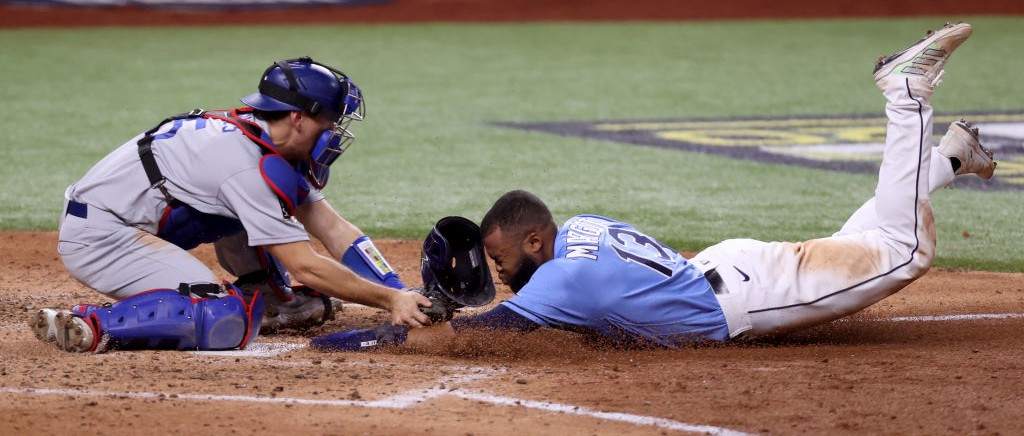
On Sunday night, we witnessed one of the rarest moments in sports: an attempt to steal home plate. In the fourth inning, Manuel Margot of the Rays found himself as the tying run on third base with no outs after stealing second and then advancing to third on a fielding error by Chris Taylor on the throw down from the catcher. However, three batters later — a walk and two non-productive outs — Margot was still standing there with Kevin Kiermaier at the plate and two outs in the inning.
Clayton Kershaw’s first pitch to Kiermaier was a strike but before his second pitch, Margot decided to try to take advantage of the left-hander’s long stretch delivery and steal home plate. It nearly worked out, but he was out by mere inches.
He’s stealing home and they ̶d̶o̶n̶’̶t̶ see him!
#WorldSeries pic.twitter.com/VfJ62CJWsa
— MLB (@MLB) October 26, 2020
Manuel Margot is the first player to try and steal home in a World Series Game since 2002. pic.twitter.com/j3mgv7gEXQ
— FOX Sports: MLB (@MLBONFOX) October 26, 2020
After the game we learned that it was Margot’s decision to steal home, not a call from manager Kevin Cash, and both in the moment and after the decision was widely panned. How could someone make the final out of the inning at home on such a brazen attempt and ruin the opportunity for a Rays rally? Why take such a wild gamble in a pivotal moment? Why would he cost his team the game?
The last point was one that became a popular refrain but, quite frankly, is a bit absurd. Margot may have cost the Rays a run, that’s very possible, but they lost 4-2, not 3-2, and, while they put Kershaw in some pressure spots by getting the first batter on in each of the first five innings, they weren’t exactly scalding at the plate. There’s a very real math argument to be made for Margot trying this steal given the incredible jump he got before Kershaw was alerted to what was happening by first baseman Max Muncy.
Margot was out, but by the slimmest of margins. Kershaw delivered a perfect throw and catcher Austin Barnes got the tag down just in time to get Margot before his hand got to the plate. As Joe Buck and John Smoltz noted on the broadcast, the play by Kershaw was, truly, spectacular. He had to step off the rubber to avoid balking (a very real possibility that would’ve advanced the runner on first to second and given Margot home) and fire a strike from an awkward spot on the mound stepping partially onto the slope but not in the way he would to throw a pitch. He did those things just about perfectly, the throw was a touch high and wide but on target, and still barely got Margot at the plate.
Margot just tried to steal home and is called OUT!
Do you agree? pic.twitter.com/IaXyQLIWRA
— FOX Sports: MLB (@MLBONFOX) October 26, 2020
If there had been no outs or one out, then yes, Margot is taking away the chance for a sac fly or a grounder up the middle for an out that may have scored him, but with two outs, they had to have a hit to score him. At the plate was Kevin Kiermaier, who has had a nice World Series, but entered that at bat as a .240 hitter this postseason (the same average he had with runners in scoring position on the season). Overall this year, he was a .217 hitter and that dropped to a rather hideous .158 average against left-handed pitching, per Fangraphs.
Clayton Kershaw isn’t just any left-hander, so with two outs, the likelihood of Kiermaier getting a hit to score Margot was somewhere in the 15-20 percent range. Given everything Kershaw and Barnes had to do right — not balk, deliver a strike from behind the rubber, catch it clean and get the tag down quickly — I have to think that, at the very least, the likelihood of success with the jump Margot got had to be pretty close to 20 percent just from all the things that could’ve gone wrong on the Dodgers end, which is to say, it wasn’t really any riskier than letting Kiermaier continue hacking away at the plate against a Hall of Famer.
Even moving beyond all of that and the actual analytics of the play, stealing home in the World Series is cool as hell. Jayson Stark of The Athletic dove into this in his roundup from Game 5, but in World Series history there have been TWO straight steal attempts of home plate. The first is Jackie Robinson’s iconic steal in 1955. The second was a failed attempt in 1982 by Lonnie Smith.
Two other men have “stolen” home successfully since Robinson as well, Tim McCarver in 1964 and Brad Fullmer in 2002, but both were on double steals, going home after a throw down to get a runner stealing second. That’s it. Stealing home is, by far, the rarest offensive feat one can pull off in the World Series, and to try it and come as close as Margot did and force a near perfect defensive play by the pitcher and catcher is pretty incredible.
The results didn’t work out but you can make a strong analytical case for the process behind the move in that situation as well as simply noting that it’s unbelievable cool to try and steal home plate in the World Series.
